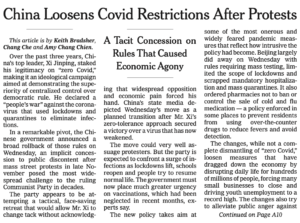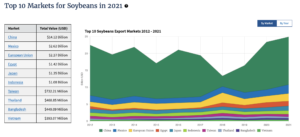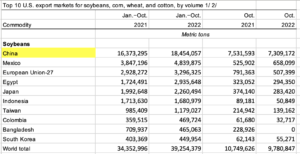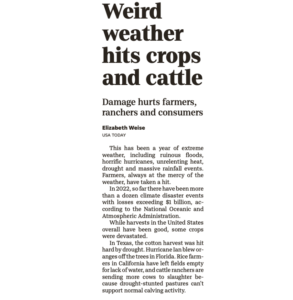A prolonged military conflict in the Middle East could potentially upend key commodity markets due to Iran’s control of the Strait of Hormuz, one of the world’s most important trade…
China Accelerates Retreat From “Zero-Covid,” While Mexico May Extend Deadline Regarding GMO Corn Imports
Selina Cheng reported on the front page of today’s Wall Street Journal that, “China dropped many of its quarantine and testing requirements and curtailed the power of local officials to shut down entire city blocks, as the government accelerates plans to dismantle zero-Covid controls in the wake of nationwide protests.
“The speed of Beijing’s retreat from its pandemic regime suggests the country’s leaders are now more concerned about the damage those controls have caused to China’s economy than the risk of worsening Covid infections that surged to a record high in November. Trade data released before the Covid easing measures were announced on Wednesday showed Chinese exports fell at the steepest pace in more than two years in November, adding to weakening factory activity and a sluggish recovery in the property sector.
“Markets seemed to greet China’s policy shift with apprehension. Shares in Hong Kong and mainland China fell Wednesday, suggesting that investors still see a messy path toward reopening, including the potential risks of soaring infections.”

Writing on the front page of today’s New York Times, Keith Bradsher, Chang Che and Amy Chang Chien reported that, “The move could very well assuage protesters. But the party is expected to confront a surge of infections as lockdowns lift, schools reopen and people try to resume normal life.”
“Beijing largely did away on Wednesday with rules requiring mass testing, limited the scope of lockdowns and scrapped mandatory hospitalization and mass quarantines,” the Times article said.
And Christian Shepherd and Lyric Li reported in today’s Washington Post that, “While many of the changes represent only a stepwise evolution, rather than a reversal, from the earlier announcement, they are among the clearest signs to date that the government is serious about dismantling its strictest controls and shifting to an approach some analysts labeled ‘zero covid in name only.’

“‘The transition to living with the virus is likely to take time,’ research firm Capital Economics said in a note on Wednesday. ‘In the interim, some restrictions will still be needed, first to buy time to vaccinate more elderly, then subsequently to manage pressure on the healthcare system during China’s reopening wave.'”
Leo Lewis noted in a column yesterday at The Financial Times that, “Markets always crave a good story and the relaxation of China’s zero-Covid policy, with the prospect of a sustained growth rebound, already has an excellent shot at being the noisiest narrative of the impending new year.”
Lewis added that, “There are still a great number of caveats to the reopening story, and even optimists guess that a version of normality will not resume until next spring. But the broad bullishness, despite all the potential for upset, has come quickly along with a tentative faith that momentum is now established.”

Reuters writer Dominique Patton reported earlier this week that, “China imported 7.35 million tonnes of soybeans in November, down 14% from a year earlier, customs data showed on Wednesday, as low river levels in key supplier the United States slowed the flow of beans to export terminals.
“Imports in the first 11 months of the year are down 8.1% at 80.53 million tonnes, according to the General Administration of Customs data.”

Meanwhile, Reuters writers Adriana Barrera and Dave Graham reported yesterday that, “Mexico has offered to extend a deadline to ban genetically modified (GM) corn until 2025 and is working on a proposal to overhaul its plan, Economy Minister Raquel Buenrostro said on Wednesday.
“Buenrostro said President Andres Manuel Lopez Obrador had told the United States Mexico could delay the contentious GM corn transition until 2025, a year later than previously expected.
“Mexico is crafting a proposal to modify and ‘make clearer’ the presidential decree which is currently set to ban herbicide glyphosate and GM corn in 2024, she added.”
Elsewhere, Elizabeth Weise reported on the front page of today’s USA Today that, “This has been a year of extreme weather, including ruinous floods, horrific hurricanes, unrelenting heat, drought and massive rainfall events. Farmers, always at the mercy of the weather, have taken a hit.
“In 2022, so far there have been over a dozen climate disaster events with losses exceeding $1 billion, according to the National Oceanic and Atmospheric Administration.
“While harvests in the U.S. overall have been good, some crops were devastated.”

Today’s article noted that, “In Texas, the cotton harvest was hit hard by drought. Hurricane Ian blew oranges off the trees in Florida. Rice farmers in California have left fields empty for lack of water, and cattle ranchers are sending more cows to slaughter because drought-stunted pastures can’t support normal calving activity.”





